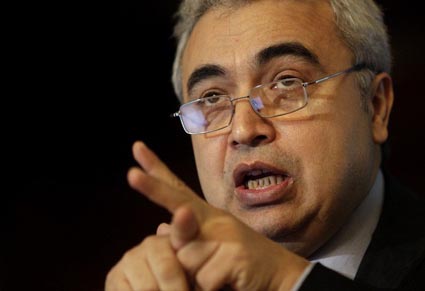
The International Energy Agency’s chief economist, Fatih Birol, stated yesterday that the oil industry needs about $38 trillion in investment to meet global demand for energy through 2035. He was speaking at a two-day ministers’ meeting foreshadowing the contents of the World Energy Outlook, due out November 9. Breaking the figure down, $10.0 trillion is needed for oil investments, $16.9 trillion for power, $9.5 trillion for natural gas from 2011 to 2035. There is, though, a shortfall in the spending in the Middle East, including North Africa, due to the Arab Spring.
That is important because, during the next decade, Dr. Birol says that 90% of the production growth will come from that region. He stated, “If we don’t find that money, then the production won’t grow as much as it needs to grow, and as a result of that, one can see much higher prices than we have now today.”
The most obvious nation of concern is Libya. Before the civil war, the nation pumped 1.6 million barrels a day, and Libya’s oil is very high quality, so-called light and sweet. Dr. Birol doesn’t expect the pre-war levels to be achieved until 2013.
On the positive side, Italian energy firm Eni’s Chief Executive Paolo Scaroni told the IEA’s ministerial delegates, “Libya is an exception, rather than the rule.” So far, anyway. The biggest reason for his optimism is Iraqi supply coming back on line – although whether the country can produce the targeted 12 million barrels a day next year is hard to say.
Overall, the IEA predicts that oil demand is going to grow by 1.3 million barrels a day next year. IEA top man David Fyfe said, “If we are heading towards a double dip in the OECD demand growth will be wiped out next year.” Growth being wiped out is far different, though, from seeing demand decline. In other words, demand is stuck at current levels in the event of a downturn, and it will rise if there is not. The need for great investment to keep supply growing is clear.